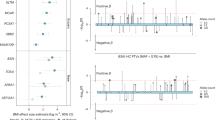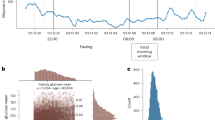Abstract
Genetic mechanisms involved in the susceptibility to salt sensitivity have not been completely clarified. This study aimed to comprehensively examine the association between genetic variants in the cyclic guanosine monophosphate (cGMP)-dependent protein kinase (PKG/PRKG) genes and blood pressure (BP) responses to dietary sodium intervention in a Chinese population. A 7-day low-sodium intervention followed by a 7-day high-sodium intervention was conducted among 1906 Han participants from rural areas of northern China. Nine BP measurements were obtained at baseline and each intervention using a random-zero sphygmomanometer. Linear mixed-effect models were used to assess the additive association of 213 tag single-nucleotide polymorphisms (SNPs) in two PRKG genes (PRKG1 and PRKG2) with salt sensitivity phenotypes. Gene-based analyses were conducted using the truncated product method. The Bonferroni method was used to adjust for multiple testing. Mean systolic BP response to low-sodium intervention significantly decreased with the number of minor T allele of marker rs10997916 in PRKG1 (P = 2.4 × 10−5). Mean systolic BP responses (95% confidence interval) among those with genotypes CC, CT, and TT were −5.6 (−6.0, −5.3), −3.7 (−4.7, −2.8), and −1.3 (−4.6, 2.0) mmHg, respectively, during the low-sodium intervention. Gene-based analyses demonstrated that PRKG1 was significantly associated with systolic BP response to low-sodium intervention (P = 1.2 × 10−3), whereas PRKG2 was nominally significantly associated with diastolic BP responses to high-sodium intervention (P = 2.6 × 10−2). The current study suggested a significant association of genetic variants in the PRKG genes with variation of BP response to dietary sodium intake in Han Chinese population. These novel findings merit further replication in future.
This is a preview of subscription content, access via your institution
Access options
Subscribe to this journal
Receive 12 digital issues and online access to articles
$119.00 per year
only $9.92 per issue
Buy this article
- Purchase on Springer Link
- Instant access to full article PDF
Prices may be subject to local taxes which are calculated during checkout


Similar content being viewed by others
References
Williams GH, Hollenberg NK. Non-modulating hypertension. A subset of sodium-sensitive hypertension. Hypertension. 1991;17:I81–85.
Hurwitz S, Fisher ND, Ferri C, Hopkins PN, Williams GH, Hollenberg NK. Controlled analysis of blood pressure sensitivity to sodium intake: interactions with hypertension type. J Hypertens. 2003;21:951–9.
Elijovich F, Weinberger MH, Anderson CA, Appel LJ, Bursztyn M, Cook NR, et al. Salt sensitivity of blood pressure: a scientific statement from the American Heart Association. Hypertension. 2016;68:e7–e46.
Gu D, Rice T, Wang S, Yang W, Gu C, Chen CS, et al. Heritability of blood pressure responses to dietary sodium and potassium intake in a Chinese population. Hypertension. 2007;50:116–22.
Hofmann F, Wegener JW. cGMP-dependent protein kinases (cGK). Methods Mol Biol. 2013;1020:17–50.
Orstavik S, Natarajan V, Tasken K, Jahnsen T, Sandberg M. Characterization of the human gene encoding the type I alpha and type I beta cGMP-dependent protein kinase (PRKG1). Genomics. 1997;42:311–8.
Ignarro LJ, Kadowitz PJ. The pharmacological and physiological role of cyclic GMP in vascular smooth muscle relaxation. Annu Rev Pharmacol Toxicol. 1985;25:171–91.
Schopfer FJ, Baker PR, Freeman BA. NO-dependent protein nitration: a cell signaling event or an oxidative inflammatory response? Trends Biochem Sci. 2003;28:646–54.
Hofmann F. The biology of cyclic GMP-dependent protein kinases. J Biol Chem. 2005;280:1–4.
Sausbier M, Schubert R, Voigt V, Hirneiss C, Pfeifer A, Korth M, et al. Mechanisms of NO/cGMP-dependent vasorelaxation. Circ Res. 2000;87:825–30.
Citterio L, Ferrandi M, Delli Carpini S, Simonini M, Kuznetsova T, Molinari I, et al. cGMP-dependent protein kinase 1 polymorphisms underlie renal sodium handling impairment. Hypertension. 2013;62:1027–33.
Schlossmann J, Ammendola A, Ashman K, Zong X, Huber A, Neubauer G, et al. Regulation of intracellular calcium by a signalling complex of IRAG, IP3 receptor and cGMP kinase Ibeta. Nature. 2000;404:197–201.
Surks HK, Mochizuki N, Kasai Y, Georgescu SP, Tang KM, Ito M, et al. Regulation of myosin phosphatase by a specific interaction with cGMP- dependent protein kinase Ialpha. Science. 1999;286:1583–7.
Sauzeau V, Rolli-Derkinderen M, Marionneau C, Loirand G, Pacaud P. RhoA expression is controlled by nitric oxide through cGMP-dependent protein kinase activation. J Biol Chem. 2003;278:9472–80.
Sauzeau V, Le Jeune H, Cario-Toumaniantz C, Smolenski A, Lohmann SM, Bertoglio J, et al. Cyclic GMP-dependent protein kinase signaling pathway inhibits RhoA-induced Ca2+ sensitization of contraction in vascular smooth muscle. J Biol Chem. 2000;275:21722–9.
Tang KM, Wang GR, Lu P, Karas RH, Aronovitz M, Heximer SP, et al. Regulator of G-protein signaling-2 mediates vascular smooth muscle relaxation and blood pressure. Nat Med. 2003;9:1506–12.
Wagner C, Pfeifer A, Ruth P, Hofmann F, Kurtz A. Role of cGMP-kinase II in the control of renin secretion and renin expression. J Clin Invest. 1998;102:1576–82.
Gambaryan S, Butt E, Marcus K, Glazova M, Palmetshofer A, Guillon G, et al. cGMP-dependent protein kinase type II regulates basal level of aldosterone production by zona glomerulosa cells without increasing expression of the steroidogenic acute regulatory protein gene. J Biol Chem. 2003;278:29640–8.
Pfeifer A, Klatt P, Massberg S, Ny L, Sausbier M, Hirneiss C, et al. Defective smooth muscle regulation in cGMP kinase I-deficient mice. EMBO J. 1998;17:3045–51.
Koeppen M, Feil R, Siegl D, Feil S, Hofmann F, Pohl U, et al. cGMP-dependent protein kinase mediates NO- but not acetylcholine-induced dilations in resistance vessels in vivo. Hypertension. 2004;44:952–5.
Michael SK, Surks HK, Wang Y, Zhu Y, Blanton R, Jamnongjit M, et al. High blood pressure arising from a defect in vascular function. Proc Natl Acad Sci USA. 2008;105:6702–7.
Citterio L, Simonini M, Zagato L, Salvi E, Delli Carpini S, Lanzani C, et al. Genes involved in vasoconstriction and vasodilation system affect salt-sensitive hypertension. PLoS ONE. 2011;6:e19620.
Liu Z, Qi H, Liu B, Liu K, Wu J, Cao H, et al. Genetic susceptibility to salt-sensitive hypertension in a Han Chinese population: a validation study of candidate genes. Hypertens Res. 2017;40:876–84.
Zhao Q, Wang L, Yang W, Chen S, Huang J, Fan Z, et al. Interactions among genetic variants from contractile pathway of vascular smooth muscle cell in essential hypertension susceptibility of Chinese Han population. Pharmacogenet Genomics. 2008;18:459–66.
GenSalt Collaborative Research Group. GenSalt: rationale, design, methods and baseline characteristics of study participants. J Hum Hypertens. 2007;21:639–46.
He J, Gu D, Chen J, Jaquish CE, Rao DC, Hixson JE, et al. Gender difference in blood pressure responses to dietary sodium intervention in the GenSalt study. J Hypertens. 2009;27:48–54.
Perloff D, Grim C, Flack J, Frohlich ED, Hill M, McDonald M, et al. Human blood pressure determination by sphygmomanometry. Circulation. 1993;88:2460–70.
Purcell S, Neale B, Todd-Brown K, Thomas L, Ferreira MA, Bender D, et al. PLINK: a tool set for whole-genome association and population-based linkage analyses. Am J Hum Genet. 2007;81:559–75.
Using JDS, PROC MIXED SAS. to fit multilevel models, hierarchical models, and individual growth models. J Educ Behav Stat. 1998;23:323–55.
Ward LD, Kellis M. HaploReg: a resource for exploring chromatin states, conservation, and regulatory motif alterations within sets of genetically linked variants. Nucleic Acids Res. 2012;40:D930–934.
Boyle AP, Hong EL, Hariharan M, Cheng Y, Schaub MA, Kasowski M, et al. Annotation of functional variation in personal genomes using RegulomeDB. Genome Res. 2012;22:1790–7.
Xu Z, Taylor JA. SNPinfo: integrating GWAS and candidate gene information into functional SNP selection for genetic association studies. Nucleic Acids Res. 2009;37:W600–605.
Zaykin DV, Zhivotovsky LA, Westfall PH, Weir BS. Truncated product method for combining P-values. Genet Epidemiol. 2002;22:170–85.
Li MX, Gui HS, Kwan JS, Sham PC. GATES: a rapid and powerful gene-based association test using extended Simes procedure. Am J Hum Genet. 2011;88:283–93.
Dickson SP, Wang K, Krantz I, Hakonarson H, Goldstein DB. Rare variants create synthetic genome-wide associations. PLoS Biol. 2010;8:e1000294.
Acknowledgements
This study is supported by the National Natural Science Foundation of China (GRANT NO. 91439202, 81570386, 91643208, 81773537, 81600332) and the Chinese Academy of Medical Sciences Innovation Fund for Medical Sciences (grants no. 2017-I2M-1–004, 2016-I2M-2–001, and 2016-I2M-1-011). The Genetic Epidemiology Network of Salt Sensitivity (GenSalt) is supported by a cooperative agreement project grant (U01HL072507, R01HL087263, and R01HL090682) from the National Heart, Lung, and Blood Institute, National Institutes of Health, Bethesda, MD, USA.
Author information
Authors and Affiliations
Corresponding author
Ethics declarations
Conflict of interest
The authors declare that they have no conflict of interest.
Electronic supplementary material
41371_2018_99_MOESM5_ESM.doc
Supplementary Table 5. P values of single SNP association analysis of the 213 SNPs in PRKG1 and PRKG2 with BP responses to dietary sodium intervention.
41371_2018_99_MOESM6_ESM.doc
Supplementary Table 6. Gene-based associations of PRKG1 and PRKG2 with BP responses to dietary sodium intervention after removing the lead marker.
Rights and permissions
About this article
Cite this article
Han, C., Hu, Z., Liu, F. et al. Genetic variants of cGMP-dependent protein kinase genes and salt sensitivity of blood pressure: the GenSalt study. J Hum Hypertens 33, 62–68 (2019). https://doi.org/10.1038/s41371-018-0099-1
Received:
Revised:
Accepted:
Published:
Issue Date:
DOI: https://doi.org/10.1038/s41371-018-0099-1



